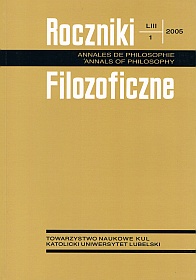From Plato to Rosenzweig: On the Relinquished Role of Dialogue in the Structure of Philosophy
Abstract
The main purpose of the article is to compare the originally Greek, Plato’s concept of dialogue and its function in the procedure of philosophying to the one developed by the 20- century “philosophy of dialogue” (F. Rosenzweig, M. Buber, F. Ebner, E. Levinas).
It seems quite astounding that philosophy of dialogue, a trend which consistently and persistently defends the privileged position of dialogue in the structure of reality and uses it as an essential factor in the understanding of the relation between God and Man, has not developed any solid methodological perspective. What is even worse, it failed to observe its presence in the very core of philosophical thinking, i.e. in Plato’s thought. We are capable of reconstructing Plato’s modus philosophandi with its essential conditions: the philosopher must not only ‘see’ the truth (the noetical function), but must also tell it to the others, choose the partners of the dialogue and defend his logos if necessary (the apophantical function).
The article consists of two complementary analyses: the first one is devoted to the presentation of the dialogical factor in Plato’s noetics and apophantics, and the second one focuses on Rosenzweig’s criticism of the whole European philosophy. The author tries to indicate its doubtful moments by putting forward the question whether Plato’s philosophy may be justly ascribed to the tradition under Rosenzweig’s criticism, and if so, to what extent.
References
Alkidamas: O autorach mówi pisanych czyli o sofistach, przeł. R. Turasiewicz, „Terminus” 1 (1999), s. 181-187.
Arendt H.: Myślenie, przeł. H. Buczyńska-Garewicz, Warszawa 1991.
Blandzi S.: Henologia. Meontologia. Dialektyka, Warszawa 1992.
Filek J.: Filozofia odpowiedzialności XX wieku, Kraków 2003.
Frazer J.G.: Złota gałąź, przeł. H. Krzeczkowski, Warszawa 1978.
Gadacz T.: Prawda w »nowym myśleniu« Franza Rosenzweiga, [w:] Rozum i słowo. Eseje dialogiczne, Kraków 1988, s. 85-98.
Heidegger M.: Bycie i czas, przeł. B. Baran, Warszawa 1994.
Heidegger M.: Co zwie się myśleniem?, przeł. J. Mizera, Warszawa–Wrocław 2000.
Kierkegaard S.: O pojęciu ironii, przeł. A. Djakowska, Warszawa 1999.
Narecki K.: Logos we wczesnej myśli greckiej, Lublin 1999.
Platon, dialogi: Eutydem, Fajdros, Gorgiasz, Hippiasz Mniejszy, Hippiasz Większy, Państwo, Protagoras, Sofista, Teajtet oraz List VII.
Rosenzweig F.: Gwiazda Zbawienia, przeł. T. Gadacz, Kraków 1998.
Rosenzweig F.: Nowe myślenie, [w:] Gwiazda Zbawienia, przeł. T. Gadacz, Kraków 1998, s. 649-692.
Schaeffler R.: Die Vernunft und das Wort. Zum Religionsverständnis bei Hermann Cohen und Franz Rosenzweig, „Zeitschrift für Theologie und Kirche”, 78 (1981), s. 57-89.
Siemek M.: Logos jako dialogos, „Principia” 27-28 (2000), s. 60-83.
Stróżewski W.: Wykłady o Platonie. Ontologia, Kraków 1992.
Szlezák Th.: Czytanie Platona, przeł. P. Domański, Warszawa 1997.
Szlezák Th.: Forma dialogu a ezoteryka, przeł. J. Szulińska, „Przegląd Filozoficzny. Nowa Seria” 6 (1997), nr 3 (23), s. 173-186.
Copyright (c) 2005 Roczniki Filozoficzne

This work is licensed under a Creative Commons Attribution-NonCommercial-NoDerivatives 4.0 International License.





